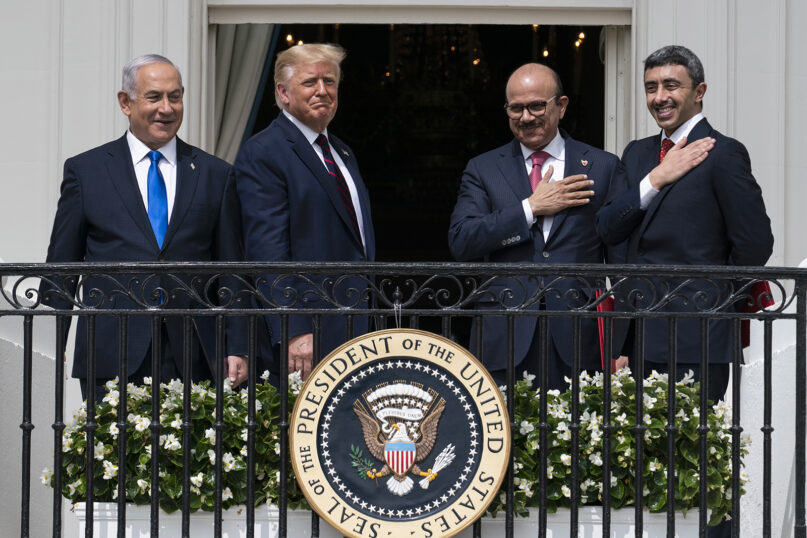(RNS) — In 2016, Jewish voters chose Hillary Clinton over Donald Trump by 71% to 24%. In two weeks, 75% say they’ll vote for Joe Biden and 22% for Trump, according to a survey released this week by the American Jewish Committee. In the swing states of Florida and Pennsylvania, where Jews make up 3%-4% of the voting population, a new poll by J Street shows margins of 75%-22% and 73%-22% respectively.
Jews, of course, have been stalwart Democratic voters for a long time — nearly a century, to be precise. Seventy-one percent voted for Al Smith in 1928 and then, with the onset of the Great Depression, they jumped into the New Deal coalition with both feet. Eighty-two percent voted for Franklin Delano Roosevelt in 1932, 85% in 1936 and 90% in 1940 and 1944.
Since then, they’ve backed off their Democratic partisanship somewhat, from time to time going so far as to give a GOP candidate 30%-40% of their votes. But despite the hopes and prayers of conservatives, they have — to paraphrase the old crack of American Jewish Committee official Milton Himmelfarb — continued to vote like Puerto Ricans even as they’ve earned like Episcopalians.
There is a major development, however, in Jewish voting patterns: the embrace of Republicanism by much of the Orthodox community, as against the other religious “streams” — Conservative, Reform, Reconstructionist and secular — which remain strongly Democratic.
This is in line with the partisan divide throughout American religion between the more and less observant. The problem for the GOP is that only 10% of the American Jewish population as a whole is Orthodox.
The Republicanism of the Orthodox is undergirded by the alliance of the GOP with the right-wing government of Israeli Prime Minister Benjamin Netanyahu, whose expansionist policies the Orthodox have strongly supported. But Republican politicians — Trump above all — have failed to grasp that Israel policy has never had much impact on the broader voting behavior of American Jews.
In 1948, Harry Truman saw Jewish support for his presidential candidacy drop by 15 points from FDR’s total four years earlier, despite his having immediately and enthusiastically recognized the provisional Israeli government six months prior to the election. In 1956, the Jewish vote in favor of President Dwight Eisenhower’s reelection actually increased from 36% to 40% despite his stern criticism of Israeli military action during the Suez Crisis on the eve of the election.
Jimmy Carter’s brokering of the 1978 Camp David Accords that led to the 1979 peace treaty between Israel and Egypt did nothing to help him with Jewish voters. In his unsuccessful 1980 reelection campaign, 15% of them voted for John Anderson, the independent, resulting in the lowest portion of the Jewish vote for a Democratic presidential candidate — 45% — since 1920, when 38% voted for the socialist Eugene Debs.
To be sure, there’s reason to think that the perception of President Barack Obama as less than a great friend of Israel — and/or the evident tension between him and Netanyahu — may have contributed to the decline in his Jewish electoral support from 78% in 2008 to 69% in 2012. That may have contributed to Trump’s sense that moving the American Embassy to Jerusalem, his abandonment of the Iran nuclear deal and his notably pro-Israel peace plan would elicit at least a modest shift in his favor among Jewish voters.
Or, as he put it last year, “I think that any Jewish people that vote for a Democrat, I think it shows either a total lack of knowledge or great disloyalty.”
Actually, it shows that, for American Jews, Israel is not a partisan issue. In the AJC survey, while 59% of respondents say that being connected to Israel is “very important” or “somewhat important” to their identity, Israel garnered less than 5% on a listing of “the most important issue” in the campaign. On a list of “important issues” compiled in another recent survey of Jewish voters, Israel ranked 17 out of 19.
Nevertheless, it is possible that, taken alone, Trump’s pro-Israel behavior might now be showing up in the form of Jewish electoral support. In the AJC survey, fully 42% said that he would be better at strengthening U.S.-Israel ties than Biden. (Fifty-four percent thought Biden would be better.)
But the rise of anti-Semitic rhetoric and violence on the right has stunned the American Jewish community, and Trump’s insistence on both-sidesing it when it comes to his white supremacist supporters has conjured up memories of fascist demagoguery and pogroms.
Whatever connection they feel to Israel, for the large majority of Jewish Americans electoral politics is local — and, like it or not, Democratic.






